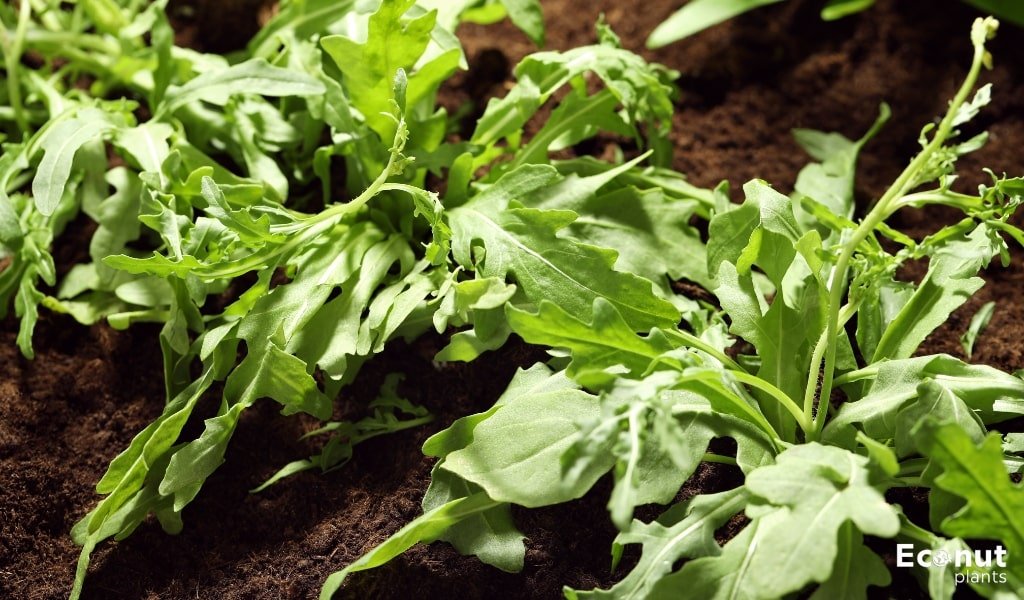Arugula, often called the rocket, this popular salad green grows swiftly and adds a delightful acidity to your favourite meals. This crop is a wonderful addition to any garden because it is easy to grow and thrives in mild regions.
In this comprehensive guide, we’ll cover everything from companion planting to seed conservation to site preparation for rocket production.
Types of Arugula
Before we begin, it is vital to note that there are various kinds of rockets available, and each has a distinct flavour profile and growing behaviour.
Sylvetta has a stronger flavour, is more compact, and develops more gradually. Its mouth-watering yellow blossoms distinguish it from the more widely available white-flowered commercial kinds of rockets. Sometimes, adding sylvetta to salads with mesclun combinations improves their flavour.
Astro Arugula and Astro Rocket are popular choices because of their mild flavour and early harvest readiness, especially for those who like less spice in their els. It tastes fantastic in salads and goes well with a variety of greens.
Rocket Arugula is a strong-leafed, spicy rocket cultivar with early blooming. If you love Rocket and want to spice up your salads, this is a great option.
Site Preparation
Arugula is a low-maintenance, adaptable plant that is ideal for novice and seasoned gardeners alike. Pick a spot that drains properly and has fertile soil to ensure a healthy yield. Additionally, rocket grows well in window boxes or other pots planted with a compost-based mixture.
Due to its capacity to thrive in a variety of soil types and growth situations, the rocket is a fantastic addition to any garden. You can profit from this tasty leafy green, whether you have a large backyard or just a tiny balcony.
When preparing the area for rockets, keep the following in mind:
Soil: Rich, well-drained soil with lots of organic matter is ideal for rocket growth. It does well on soil that ranges from pH 6.0 to pH 7.0. The top 3 inches (8 cm) of soil should have some completed compost added to it to ensure your rocket plants get the nutrients they require for healthy growth. This will increase fertility.
Sunlight: Arugula can withstand a little shade, but it prefers full sun. If you plant it in an area where summer heat is extreme, you may be able to keep the leaves from becoming too bitter too soon by providing some afternoon shade.
Water: Make sure the ground is consistently moist, but not soggy. Watering a rocket on a regular, yet occasional, basis is necessary. Ensure that the soil is continuously moist to promote healthy growth, especially amid dry spells.
Container Gardening: For container gardening, Rocket is perfect. Plant it in window boxes or pots that have been filled with a compost-based container mix. Just make sure there is adequate drainage in the containers to avoid water logging.
Sowing and Growing Arugula
Rockets are simple to plant and grow, but to get the most benefits, close attention to detail is necessary. Fresh rocket leaves are edible soon after they sprout because of their rapid growth.
Sowing Arugula: You can sow rocket seeds directly in your garden or, for a quicker start, sow them in cold frames or hoop houses.
- Direct Sowing: Plant rocket seeds outside as soon as the soil is ripe for planting in the spring. As long as the weather is cool, you can replant every three weeks. Plant the seeds around the middle of October for a winter crop.
- Indoor Starting: It is not recommended to directly plant rockets into high tunnels or cold frames. To transplant, it can also be started inside. Either in the early spring or late autumn sows the seeds. Just make sure you give yourself enough room to breathe on hot days.
Spacing: The distance between your rocket plants is essential for optimum growth. Keep your plants spaced about 1 inch (2.5 cm) apart in your rows. When planting rockets in beds, give each plant a space of around 6 inches (15 cm). To give the plants enough room for healthy growth, gently cut them down until they are just 6 inches (15 cm) tall.
Germination: Rocket seeds typically take five to seven days to sprout. Because it germinates quickly, it is a satisfying option for gardeners who are eager to see the fruits of their labour.
Temperature: Arugula grows best on soil that is between 50 and 65 degrees Fahrenheit (10 and 18 degrees Celsius). Because of its tolerance for light frost, it’s a great plant to plant in the early spring or late autumn.
Pests, Diseases, and Other Challenges
Rocket generally doesn’t cause issues; however, it occasionally encounters pests and diseases. Being aware of these potential issues and knowing how to address them is essential for a successful rocket harvest.
Common Pests: The common pests, flea beetles and aphids, might harm your rocket plants. Tiny insects called aphids can infest rocket plants, drawing sap from the leaves and distorting the plant. Neem oil and insecticidal soap are good ways to deal with aphid infestations. Just make sure you apply frequently enough to bring the population under control.
Heat: The leaves of a rocket can become unpleasant in hot weather, particularly during long days and high temperatures. Give your rocket plants rich soil and regular watering if you want to harvest them before they get too bitter.
If you live in an area where summers are very hot, you might want to plant rockets in the spring and again when the summer heat subsides. As an alternative, you can overwinter your rocket plants for a winter harvest in colder climates.
Regular Sowings: Ideally, you should plant rockets every three weeks to provide a steady supply. Using this method, you will profit from a harvest that is consistent throughout the growing season.
Harvest and Storage
Rocket leaves grow quickly, so you may start gathering them when they are two to three inches long. This often occurs two or three weeks after the seedlings germinate. The procedure for collecting and storing rockets is as follows:
Harvesting: You can choose to harvest individual leaves or the entire plant. While the leaves are still soft and fresh, select them for maximum taste. The leaves keep their exquisite flavour until the plant starts to bolt. Remember that certain rocket plants have edible blossoms; consider allowing them to flower and adding them to your salads for a unique flavour.
Storage: To keep your rocket fresh, place it in the refrigerator. Put the collected leaves in a paper towel-lined container or plastic bag to preserve more moisture. In this manner, the fresh, peppery aroma of the rocket will linger in your mouth for several days.
Saving Seeds
You can experiment with different rocket kinds and have a sustainable supply of rocket seeds for future plantings. Understanding arugula’s reproductive traits and the procedures involved is crucial to properly preserving its seeds.
Arugula Seed Basics: Since the rocket is an annual that outbreeds itself, warm weather speeds up its bolting to seed. Surprisingly, rockets can withstand some frost but not particularly deep freezes. Therefore, it is the best choice for areas with warmer winters.
Reproductive Biology: Rocket flowers are self-sterile, meaning that cross-pollination requires insects. Variety among the Brassicaceae family is compatible with some other genera or species; however, different kinds of rockets can hybridize. Changes to space rockets must be at least 0.5 miles apart to maintain the integrity of the seed.
Seed Longevity: Rocket seeds can survive for up to five years if properly cared for. To maintain their vitality, store seeds in a cool, dry spot away from moisture and direct sunlight.
Pollination: To ensure successful pollination, consider including pollinators such as bees in your garden. Bees are essential for proper pollination, which is necessary for rocket flowers to fully develop into seeds. Following pollination of the blooms, the plant will produce seed pods.
Harvesting Seeds: To collect the rocket seeds, wait for the pods to dry and ripen on the plant. The pods will turn brown and become brittle when they are ready to be picked. Carefully gather the dried seed pods and keep them somewhere dry and cold.
Conclusions
Finally, the rocket is a satisfying and adaptable plant for your garden. You can take advantage of a plentiful harvest of this tart green all year long with careful site preparation, sowing, and companion planting.
To develop a vibrant and varied garden, experiment with companion plants, and don’t forget to store your seeds for further plantings. No matter how experienced a gardener is, rockets are a must in any home garden.
From sowing the seeds to eating a fresh, home-grown salad, this in-depth guide offers all the knowledge you need to grow rockets effectively. In a few weeks, you may be harvesting fresh rockets from your patio or yard. Let’s begin growing now!

